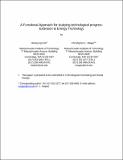A functional approach for studying technological progress: Extension to energy technology
Author(s)
Koh, Heebyung; Magee, Christopher L
DownloadAccepted version (359.0Kb)
Publisher Policy
Publisher Policy
Article is made available in accordance with the publisher's policy and may be subject to US copyright law. Please refer to the publisher's site for terms of use.
Terms of use
Metadata
Show full item recordAbstract
This paper extends a broad functional category approach for the study of technological capability progress recently developed and applied to information technology to a second key case—that of energy based technologies. The approach is applied to the same three functional operations—storage, transportation and transformation—that were used for information technology by first building a 100 plus year database for each of the three energy-based functional categories. In agreement with the results for information technology in the first paper, the energy technology results indicate that the functional approach offers a stable methodology for assessing longer time technological progress trends. Moreover, similar to what was found with information technology in the first study, the functional capability for energy technology shows continual—if not continuous—improvement that is best quantitatively described as exponential with respect to time. The absence of capability discontinuities—even with large technology displacement—and the lack of clear saturation effects are found with energy as it was with information. However, some key differences between energy and information technology are seen and these include:
*Lower rates of progress for energy technology over the entire period: 19–37% annually for Information Technology and 3–13% for Energy Technology.
*Substantial variability of progress rates is found within given functional categories for energy compared to relatively small variation within any one category for information technology. The strongest variation is found among capability progress among different energy types.
*More challenging data recovery and metric definition for energy as compared to information technology.
These findings are interpreted in terms of fundamental differences between energy and information including the losses and efficiency constraints on energy. We apply Whitney's insight that these fundamental differences lead to naturally modular information technology artifacts. The higher progress rates of information-based as opposed to energy-based technologies follows since decomposable systems can progress more rapidly due to the greater ease of independent as opposed to simultaneous development. In addition, the broad implications of our findings to studies of the relationships between technical and social change are briefly discussed.
Date issued
2008-07Department
MIT Institute for Data, Systems, and SocietyJournal
Technological Forecasting and Social Change
Publisher
Elsevier BV
Citation
Koh, Heebyung and Magee, Christopher L. 2008. "A functional approach for studying technological progress: Extension to energy technology." Technological Forecasting and Social Change, 75 (6).
Version: Author's final manuscript